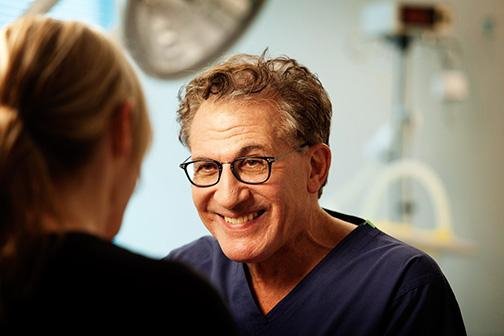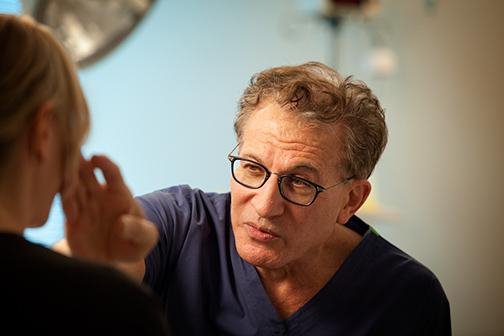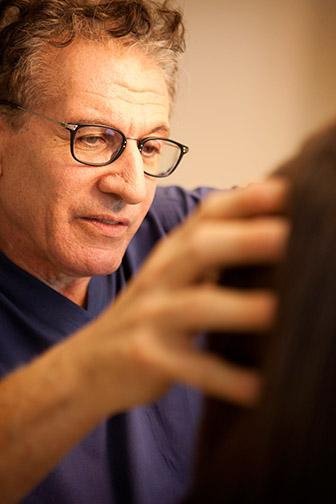Dr. Douglas J. Key - Key Laser Institute for Aesthetic Medicine
/Dr. Key's passion for research began at an early age, when he earned the opportunity to work with a Nobel Prize winning professor as a freshman at the University of California, Berkeley. Throughout his undergraduate education, Dr. Key travelled the country to take part in research opportunities in various aspects of biological sciences. Through this research, he became interested in the field of medicine.
Name: Dr. Douglas J. Key
Clinic: Key Laser Institute
Location: Portland, OR
Website: keylaserinstitute.com
That's interesting: Dr. Key's most well-known research took place when he was a Clinical Fellow at the National Cancer Institute in Maryland. During this time, his innovative research led to the development of the drug Retin-A, which is commonly used for acne treatment and wrinkle reduction. He also spent time researching skin cancer prevention techniques and cellular methods to repair damaged skin.
Where do you see skin care moving and is there any topical treatments that have the possibility of displacing current medical technologies?
Where things are going in cosmetic medicine is a great question. Let’s begin by saying cosmetic medicine as a defined area of specialty knowledge and practice is barely a little over 10 years old. And by that I mean cosmetic medicine as a specialty medical based practice, a knowledge base deep enough to be exclusively devoted to aesthetics and separate from surgery and general dermatology. Ten years ago Thermage™ was just getting its FDA clearance, allowing us to do the unimaginable at that time - tighten skin without surgery. Fillers were just coming on board, but just used to fill lips. There were no concepts yet as to treating the aging face. There were no fractionated or pixilated resurfacing, it just hadn’t been invented yet. And the idea of using stem cells or platelet rich plasma, it was well off in the future.
So in the first 10 years of cosmetic medicine we learned how to treat aging. In these next 10 years, we will no longer be just treating aging, we will truly be preventing aging. What a difference that will make.
The future, which is already here, is not just what treatments we use in the office, but what is the best for your skin care program for every day use at home.
You offer lipo contouring treatments using Liposonix, LipoSelection and CoolLipo. What do you think of these devices’s efficacy? Where could it be improved? Does it have any shortcomings?
The improvement in our patients with CoolSculpting, which is totally noninvasive, are really amazing. We have had CoolSculpting now almost three years, and the results have really improved, partly because we now use overlapping chambers. We just have a better feel for how to place the cooling chambers. We also do a better job of clearly letting our patients know if it’s the best treatment for them, and how many sessions they should do - one, two or three sessions.
I often can’t tell the difference between before and after photos of patients who have had totally noninvasive CoolSculpting, and those who had liposuction, either with VASER Liposelection, or CoolLipo.
Shortcomings, that’s simple. How to make it easier for our patients to get to their target body weight in the first place. Because liposuction never was, and never will be weight loss.

You also offer LipoGraft, using your body's own cells, mixed with one unit of skin health enhancing Platelet Rich Plasma. Can you tell us more about this procedure?
This is a WOW procedure! It’s totally natural.Why not use nature’s best filler, your own fat? How does this work? You borrow fat from say the tummy and thighs, areas that don’t want to lose fat as we get older, and use this fat to fill back, to give back, youthful fullness to the face. But fat is not simply fat, fat is loaded with regenerative cells, these are called adult stem cell. So the effects of fat transfer are not just a more youthful shape, but also healthier skin. We mix the “borrowed from the tummy fat” with your own platelet rich plasma, to activate these cells, and increase fat cell survival. All of our patients are told to bring a photo of when they were in their 20s to best see what the natural facial shape was before aging made that fat disappear. The fat transfer itself is never done with needles, but with something new called microcannulas. And although fat survival can vary of course from patient to patient, fat transfer injection, which we call LipoGraft, can last years and years.
Are there any technologies that you would recommend that physicians stay away from, either for medical or business reasons?
Yes, laser resurfacing or so called C02. It’s a great procedure, it may be the best there is for lines and wrinkles. There’s nothing that comes close, however, it is an art form, so if your doctor has literally not done 100s or more, choose someone else.
A large number of physicians who are not plastic surgeons or dermatologists have move into cosmetic medicine by focusing on nonsurgical cosmetic technologies like IPL and injectables. As a dermatologist, what do you think about this? Has it affected your business in any way?
This is sort of common sense. You would, I hope, choose an orthopedic surgeon to do your knee surgery. Why would you choose your family doctor, or gynecologist to inject your face? If you’re in an office why not ask the basic question, who is the supervising doctor? Nurses can do a great job as well. Remember, it takes years to acquire the skills to do it right, and not just a short weekend course.
The problem here in Oregon may even be worse. It’s not just doctors who are part of the problem, but aestheticians doing laser and injection procedures all on their own, without any doctors present at all. With harm being done, and no efforts on the licensing boards to bring any common sense restrictions to better ensure a higher standard of public safety.
Are there any treatments or technologies that you're especially excited about that haven't hit the market yet? What do you think about new therapies (like stem cells or others) that are being developed outside the US?
That’s a definite YES. There is a new treatment called ThermiTight, which I began working with off label one year ago and just gained FDA clearance this month. This may be the best treatment yet for neck wrinkles. This is a next generational approach to aging. It not only tightens the skin from the skin surface, but with the use of a “smart” tiny needleless probe beneath the skin, tightens the deeper collagen (we use the word fascia) below skin to lift and tighten the neck without surgery.
This breaks into a brand new concept in treatment. Targeting the heat energy by using thermal imaging to guide the treatment.

You've been successful in growing your practice, but what marketing mistakes have you made? What tactics didn't work?
Maybe four words, Group On and Living Social. They are too gimmicky and most of the time don’t have a lot to do with what might be best for the patient.
Where would you like your business to be in five or ten years?
That’s easy. In five years from now, I want most of our patients to look younger and more vibrant than they look today. In other words, to beat the clock.
What's the best advice you've ever received as a physician?
To practice medicine well you need to love medicine and always remember it’s a privilege to help the people we call our patients. So, do your best every day.
What's the best business advice you've ever received?
Don’t worry about the clock, enjoy your patients. Each one of them is different and each one is special!
About: Dr. Douglas Key received his Bachelor's degree from the University of California, Berkeley, before graduating with a degree in Medicine from the University of California School of Medicine in San Francisco. His Dermatology residency was split between patient-focused New York University and research-intensive Yale University.
As a Clinical Fellow at the National Cancer Institute in Bethesda, Maryland, Dr. Key's research eventually led to the development of Retin A, as well as the vitamin derivatives that are now standards in clinical dermatology. During this time, he was also actively involved in researching the possible causes and the prevention of skin cancer. His special interest was the study of the cellular mechanisms within the skin that are essential to life and that assist in the repair of tissue damaged by ultraviolet radiation.
Distinguished among dermatologists in Portland and across the US, Dr. Douglas J. Key is one of the nation's leading authorities in the field of cosmetic laser treatments like Fraxel® and a top skin doctor in Portland. A published author, he is frequently sought after by his peers to both lecture and instruct in the United States, Europe and Asia on his specialty of laser and light medical applications, skin restoration and the prevention of age-related tissue changes.
This interview is part of a series of interviews of physicians running medical spas, laser clinics and cosmetic surgery centers. If you'd like to be interviewed, just contact us.





